人教版八年级上册unit2讲解和练习
人教版八年级上册英语 Unit 2 重要知识点配套练习题【附答案解析】

Unit 2 How often do you exercise?知识点一:本单元重点语法知识点练习题◆频度副词⑴选择题( ) 1. I ______ ride a bike to school. But this morning, I walked to school.A. neverB. hardlyC. seldomD. usually( ) 2. —How often do you go skating?—______ . I can't skate at all.A. AlwaysB. SometimesC. SeldomD. Never( ) 3. —Laura, how often do your family take a trip?—Hmm, ______ .A. twice a monthB. since last weekC. for an hourD. ten days ago ( ) 4. If my friends have any problems, my door is ______ open to them.A. seldomB. sometimesC. alwaysD. never( ) 5. Although he listened to the old man ______ , he could ______ understand his words.A. patiently;hardlyB. patient;hardC. patiently;hardD. patient;hardly( ) 6. —would you like a glass of cola?—No, thanks. I ______ drink cola. I cant stand(忍受) its taste.A. usuallyB. neverC. oftenD. always( ) 7. —How often do you usually go to work by subway?—______ . I always take a bus, because there is no subway in this city.A. SometimesB. OftenC. NeverD. Seldom( ) 8. “Left-behind” children(留守儿童) ______ see their parents, because their parents work in the cities, leaving them behind in the countryside to be cared for by their grandparents.A. alwaysB. hardly everC. oftenD. usually( ) 9. —I heard you made a new family rule(规则) "Put away your phone while at home ".—Yes. We were ______ busy checking our mobile phones before, but now we enjoy communicating(沟通) with our family.A. alwaysB. neverC. seldomD. sometimes( ) 10. We'll have to say goodbye, my dear friends! But I will ______ forget the days we spent together.A. alwaysB. oftenC. neverD. usually⑵选择适当的频度副词填空1. Milk can help us sleep well, so I __________ (always/ never ) drink milk before going to bed.2. Jeff __________ (often/hardly ever) plays chess. It's easy for him.4. I __________ (sometimes/usually) eat a healthy breakfast because my mom makes breakfast for me most of the time.5. Mr. and Mrs. Clark are very busy, so they __________ (hardly ever/usually) play sports.知识点二:本单元重点单词变形练习题⑴ 用所给单词的适当形式填空1. You'd better think __________ (two) before you take the final action(最后行动).2. My mother is very busy. She has lots of __________ (housework) to do every day.3. Jane likes __________ (stay) at home to read books and she hardly ever __________ (go) out.4. What a hot day today! How about __________ (go) swimming together?5. The young man __________ (exercise) three times a week.6. Would you like to do some __________ (shop) on Saturday morning?7. Tom, you need to sleep for at __________ (little) eight hours every night.8. She __________ (go) swimming with her mother __________ (two) a week.9. He __________ (usual) goes to the library on weekends.10. The old man __________ (die) last month.13. You will see different kinds of __________ (television) in the museum.14. Do you have a __________ (health) lifestyle?15. Han Han is my favorite __________ . He __________ a very popular book last year.(write)16. Linda spent twenty dollars __________ (buy) a dictionary yesterday.⑵用方框中所给单词适当形式填空I'm interested in playing sports. I like playing every sport, but my 1. __________ one istennis. Behind my house, there is a tennis court (网球场). Three or four 2. __________ a week, I play tennis happily with my sister or my brother on this court after school. We always enjoy 3. __________. However, sometimes I play with my father too, because he also 4. __________ playing tennis. He always 5 __________ to us, “Tennis is a popular sport for both young and old people” Besides 6. __________ sports, I also like taking a trip with my friends. From Monday to Friday, I don't have a lot of free time. But I have a lot of free time on 7 __________ . So 8.__________ a week, we go for a ride to villages far away from our city. We 9. __________ like the fresh air and beautiful views in the countryside. After we get back from the trip, I often spend time watching TV at home, because there are many 10. __________ shows on Saturdays and Sundays.I enjoy my free time!There are many ways for us to exercise. We can walk, run, swim or jump. We have a lot of choices(选择). 1. __________ do we like exercising? Because it's good for our health. In addition(此外), exercise makes us tired, so we can have a much 2. __________ sleep at night.Walking is a good kind of exercise. You may take 3. __________ walk in the park. You can walk on the beach to enjoy 4. __________ . You can also walk with your friends because this will make your exercise more fun 5. __________ walking alone.You may like to run. If you do, take care of your 6. __________ . Make sure you have the right shoes.Some people like to swim. 7. __________ , others don't like to be in the water. If you like this kind of exercise, you'd better ask someone 8. __________ with you. They can give you help when you 9. __________ in danger.Jumping rope(跳绳) and riding bikes are also good for your body. Find out which one you like better and keep on 10. __________ it. You will know what makes you healthy.知识点三:本单元重点短语练习题⑴根据汉语提示完成句子1. 也许她在图书馆。
人教版八年级英语上册Unit 2重要知识点讲解

Unit2How often do you exercie?重要知识点讲解惯用法:1. help sb. with sth 帮助某人做某事2. How about…? ….怎么样?/ ….好不好?3. want sb. to do sth. 想让某人做某事4. How many + 可数名词复数+ 一般疑问句….有多少…..5. 主语+ find+ that 从句…发现…6. It’s + adj.+ to do sth. 做某事是….的7. spend time with sb. 和某人一起度过时光8. ask sb. about sth. 向某人询问某事9. by doing sth. 通过做某事10. What’s your favorite…..? 你最喜欢的……是什么?11 start doing sth. 开始做某事12. the best way to do sth.做某事的最好方式词语辨析:1. how often 多久一次,用来提问动作发生的频率。
回答用:once,twice, three times 等词语。
How often do you play sports? Three times a week.how long 多长,用来询问多长时间,也可询问某物有多长。
How long does it take to get to Shanghai from here? How long is the ruler?how for 多远,用来询问距离,指路程的远近。
How far is it from here to the park? It’s about 2 ki lometers.2.free 空闲的,有空的,反义词为busy.be free 有空,闲着,相当于have time.I’ll be free next week. = I’ll have time next week.还可作“免费的、自由的”解。
人教版英语八年级上册Unit2Howoftendoyouexercise课后练习及答案

人教版英语八年级上册Unit2 How often do you exercise课后练习一及答案Ⅰ.单项选择1.She is ______girl.She always gets good grades.A.such a clever B.s o a cleverC.such clever a D.so clever2.______Mum asked me to close the door,______I forgot to do so.wA.Though;but B.Although;butC.But;/ D Although;3.Though he eats many vegetables to keep______,he is in bad______.A.health;health B.healthy;healthyC.healthy;health D.health;healthy4.Do you t hink the best way to relax is ______ exercise?A.though B.throughC.over D.across5.It's very cold today.Please keep the door______A.close B.closedC.open D.openedⅡ.用所给动词的适当形式填空1.I ______(be)good at playing soccer.2.Lucy______(be)from America.3.Jim and Tim______(be)twin brothers;they ______(look)the same.4.He often______(go)swimming in summer.5.The light______(travel)faster than the sound.Ⅲ.根据汉语提示完成句子1.______(百分之四十五) of students usually exercise on the playground.2.My brother has many balls,______(例如) basketballs and footballs.3.We have ____________(多于) forty classes every week.4.____________(多久一次) do you play sports?5.If we sleep ____________(不到;少于) six hours every night,we can feel tired in the day.参考答案Ⅰ.1. 答案:A点拨:考查such和so的区别。
人教版英语八年级上册例题与讲解:Unit2HowoftendoyouexerciseSectionA
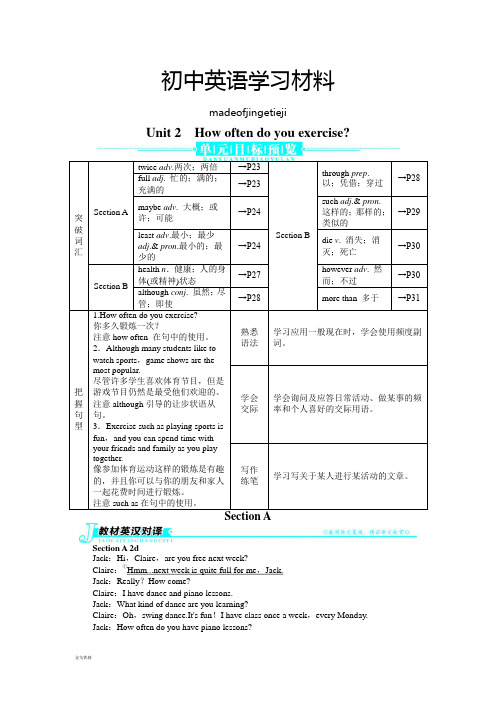
初中英语学习材料madeofjingetiejiUnit 2How often do you exercise?突破词汇Section Atwice adv.两次;两倍→P23Section Bthrough prep.以;凭借;穿过→P28 full adj. 忙的;满的;充满的→P23maybe adv. 大概;或许;可能→P24such adj.& pron.这样的;那样的;类似的→P29least adv.最小;最少adj.& pron.最小的;最少的→P24die v. 消失;消灭;死亡→P30 Section Bhealth n.健康;人的身体(或精神)状态→P27however adv. 然而;不过→P30 although conj. 虽然;尽管;即使→P28more than 多于→P31把握句型1.How often do you exercise?你多久锻炼一次?注意how often 在句中的使用。
2.Although many students like towatch sports,game shows are themost popular.尽管许多学生喜欢体育节目,但是游戏节目仍然是最受他们欢迎的。
注意although引导的让步状语从句。
3.Exercise such as playing sports isfun,and you can spend time withyour friends and family as you playtogether.像参加体育运动这样的锻炼是有趣的,并且你可以与你的朋友和家人一起花费时间进行锻炼。
注意such as在句中的使用。
熟悉语法学习应用一般现在时,学会使用频度副词。
学会交际学会询问及应答日常活动、做某事的频率和个人喜好的交际用语。
写作练笔学习写关于某人进行某活动的文章。
Section ASection A 2dJack:Hi,Claire,are you free next week?Claire:①Hmm...next week is quite full for me,Jack.Jack:Really?How come?Claire:I have dance and piano lessons.Jack:What kind of dance are you learning?Claire:Oh,swing dance.It's fun!I have class once a week,every Monday.Jack:How often do you have piano lessons?Claire:Twice a week,on Wednesday and Friday.Jack:Well,how about Tuesday?Claire:Oh,I have to play tennis with my friends.But do you want to come?Jack:Sure!,杰克:你好,克莱尔,下周你有空吗?克莱尔:呣……下周我很忙,杰克。
人教版八年级英语上册Unit1-Unit2知识点详解和练习试卷

人教版八年级英语上册Unit1-Unit2知识点详解和练习试卷一、课堂讲解1、tayhealthy=keepingoodhealth保持健康2、giveb.th.=giveth.tob.把某物给某人3、needtodoth.需要做某事4、keep/tay/behealthy=keep/tay/beingoodhealth=keepfit保持健康5、take/doe某ercie=play/doport锻炼,做运动6、betheamea与……相同7、bedifferentfrom不同8、afor至于;关于9、ofcoure=ure当然;确信10、lookafter=takecareof=carefor照顾;照看11、alotof=lotof=plentyof许多;大量12、hardlyever几乎不13、begoodfor对……有益14、trytodoth.尝试做某事15、getgoodgrade取得好成绩16、helpb.[to]doth.帮助某人做某事17、kindof有点18、eatinghabit饮食习惯1、want[b.]todoth.想要(某人)做某事2、betreedout紧张的;有压力的3、atthemoment=rightnow=now现在(atthatmoment过去进行式)4、What'thematter=What'wrong=What'theproblem怎么了?5、lie(-lay-lain;lying)downandret躺下休息6、eeadoctor看病7、eeadentit看牙医8、hopetodoth.希望做某事9、it'+adj.+[forb.]+todoth.做某事(对某人来说)……(加形容词)10、gettired感到疲倦11、have/catcha(bad)cold=havegota(bad)cold患(重)感冒12、haveaorethroat=haveapaininone'throat喉咙痛13、haveatomachache=haveaoretomach=haveapaininone'tomach胃痛14、haveaoreback背痛15、haveatoothache牙痛16、havea(high)fever=havea(high)temperature发(高)烧17、lookwell(healthy)看起来很健康18、drinkhotteawithhoney喝加蜂蜜的热茶19、drinklotofwater多喝水20、oundlikeagoodidea听起来像个好主意。
初中英语 人教版八年级上册 Unit 2 重点词汇、词组复习及练习
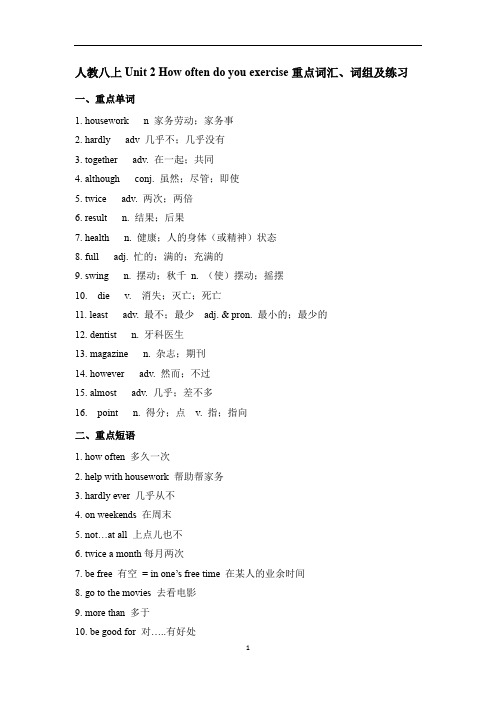
人教八上Unit 2 How often do you exercise重点词汇、词组及练习一、重点单词1. housework n 家务劳动;家务事2. hardly adv 几乎不;几乎没有3. together adv. 在一起;共同4. although conj. 虽然;尽管;即使5. twice adv. 两次;两倍6. result n. 结果;后果7. health n. 健康;人的身体(或精神)状态8. full adj. 忙的;满的;充满的9. swing n. 摆动;秋千n. (使)摆动;摇摆10. die v. 消失;灭亡;死亡11. least adv. 最不;最少adj. & pron. 最小的;最少的12. dentist n. 牙科医生13. magazine n. 杂志;期刊14. however adv. 然而;不过15. almost adv. 几乎;差不多16. point n. 得分;点v. 指;指向二、重点短语1. how often 多久一次2. help with housework 帮助帮家务3. hardly ever 几乎从不4. on weekends 在周末5. not…at all 上点儿也不6. twice a month每月两次7. be free 有空= in one’s free time 在某人的业余时间8. go to the movies 去看电影9. more than 多于10. be good for 对…..有好处11. junk food 垃圾食品12. such as 例如;像……这样13. stay up late 熬夜;睡得很晚14. at least 至少;不少于;起码15. play sports 进行体育活动16. go online 上网17. the best way to do sth. 做某事的最好方式三、词性转换1. one—once(副词)2. empty/ hungry—full(反义词)3. little—less(比较级)—least(最高级)4. healthy adj.健康的—health(名词)5. body n. 身体—bodies (复数)6. die v.死亡—dying (现在分词)—died (过去式)7. write v. 写—writer (名词,指人)—wrote(过去式)四、巩固练习I.写单词。
最新人教版英语八年级上册Unit2同步讲义和巩固练习(教师版)

八年级上册Unit2 How often do you exercise ? 【重点短语】1. 在周末on weekends2. 几乎不hardly ever3. 例如such as4. 去看牙医go to the dentist5. 每周一次once a week6. 去看电影go to the movies7. 上网/用网use the Internet8. 有空be free9. 至少at least10. 熬夜stay up late11. 对…有好处be good for12. 去野营go camping13. 在某人的空闲时间in one’s free time14. 根本不not….at all15. 最流行the most popular16. 帮助做家务help with housework17. 购物go shopping18. 超过/多于more than19. 少于/不到less than20. 和某人一起度过时光spend time with sb.21. 向某人询问某事ask sb. about sth.22.令某人惊讶to one’s surprise23. 做某事的最好方式the best way to do sth.24.多久一次how often【重点句型】1.A: How often do you go to the movies? 你多久看电影一次?B: I go to the movies maybe once a month.可能一个月看一次。
how often 多久一次,用来提问频率。
2.A: What does she do on weekends? 她周末干什么?B: She sometimes goes shopping.她有时购物。
sometimes有时& 辨析:sometimes, some times, sometime, some time3.What’s your favorite program?你最喜欢的节目是什么?What’s your favorite...? = What... do you like best?你最喜欢的......是什么?4.Well, how about Tuesday?哦,那周二呢?How about...? =What about...? ……怎么样?,用来征求对方的意见。
Unit2 语法讲解及练习 人教版英语八年级上册
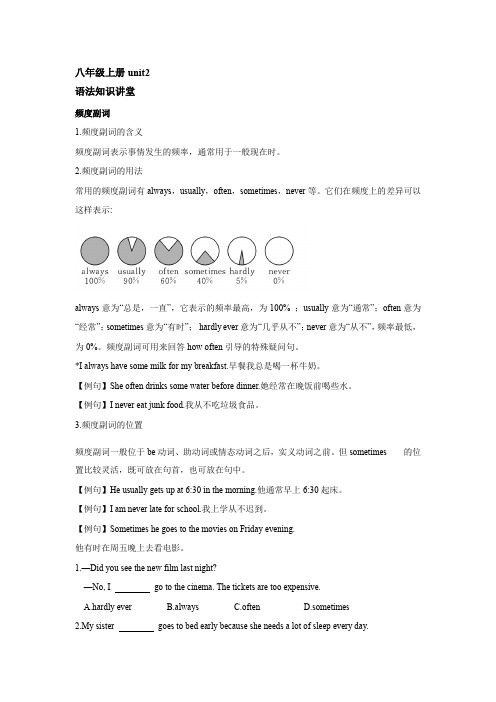
八年级上册unit2语法知识讲堂频度副词1.频度副词的含义频度副词表示事情发生的频率,通常用于一般现在时。
2.频度副词的用法常用的频度副词有always,usually,often,sometimes,never等。
它们在频度上的差异可以这样表示:always意为“总是,一直”,它表示的频率最高,为100% ;usually意为“通常”;often意为“经常”;sometimes意为“有时”;hardly ever意为“几乎从不”;never意为“从不”,频率最低,为0%。
频度副词可用来回答how often引导的特殊疑问句。
*I always have some milk for my breakfast.早餐我总是喝一杯牛奶。
【例句】She often drinks some water before dinner.她经常在晚饭前喝些水。
【例句】I never eat junk food.我从不吃垃圾食品。
3.频度副词的位置频度副词一般位于be动词、助动词或情态动词之后,实义动词之前。
但sometimes的位置比较灵活,既可放在句首,也可放在句中。
【例句】He usually gets up at 6:30 in the morning.他通常早上6:30起床。
【例句】I am never late for school.我上学从不迟到。
【例句】Sometimes he goes to the movies on Friday evening.他有时在周五晚上去看电影。
1.—Did you see the new film last night?—No, I go to the cinema. The tickets are too expensive.A.hardly everB.alwaysC.oftenD.sometimes2.My sister goes to bed early because she needs a lot of sleep every day.A.alwaysB.sometimesC.hardly everD.never3.Sandy likes travelling. She stay at home during holidays.A.hardly everuallyC.alwaysD.often答案:AAA。
Unit2基础知识点讲解练习人教版英语八年级上册
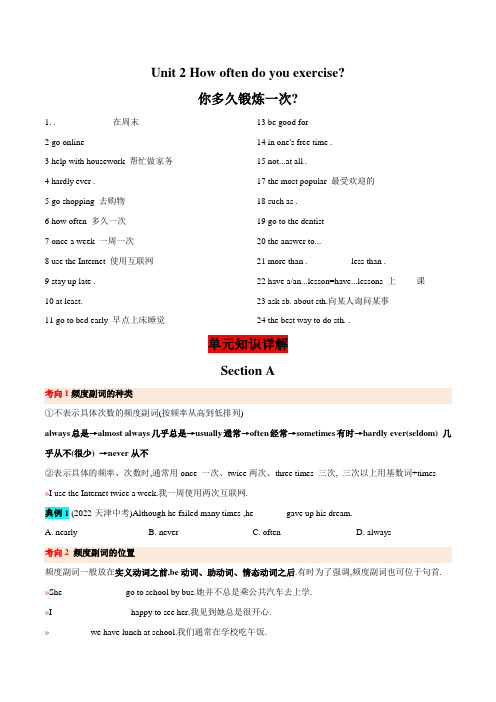
Unit 2 How often do you exercise?你多久锻炼一次?1. ._____________在周末2 go online ______________3 help with housework 帮忙做家务4 hardly ever ._____________5 go shopping 去购物6 how often 多久一次7 once a week 一周一次8 use the Internet 使用互联网9 stay up late ._______________10 at least._____________11 go to bed early 早点上床睡觉13 be good for ______________14 in one's free time ._____________15 not...at all ._____________17 the most popular 最受欢迎的18 such as ._____________19 go to the dentist _____________20 the answer to...______________________21 more than .________ less than .__________22 have a/an...lesson=have...lessons 上·······课23 ask sb. about sth.向某人询问某事24 the best way to do sth. .______________________单元知识详解Section A考向1频度副词的种类①不表示具体次数的频度副词(按频率从高到低排列)always总是→almost always几乎总是→usually通常→often经常→sometimes有时→hardly ever(seldom) 几乎从不(很少) →never从不②表示具体的频率、次数时,通常用once 一次、twice两次、three times 三次, 三次以上用基数词+times»I use the Internet twice a week.我一周使用两次互联网.典例1 (2022·天津中考)Although he failed many times ,he_______ gave up his dream.A. nearlyB. neverC. oftenD. always考向2频度副词的位置频度副词一般放在实义动词之前,be动词、助动词、情态动词之后.有时为了强调,频度副词也可位于句首. »She ______ _______ go to school by bus.她并不总是乘公共汽车去上学.»I________ _________ happy to see her.我见到她总是很开心.»_________ we have lunch at school.我们通常在学校吃午饭.考向3对频度副词的提问对频度副词进行提问常用how often,表示"多久一次".»How often does he e here? 他多久来一次这里?Once a week.一周一次.典例2 (2022·重庆中考B卷)They have P.E. four times a week now.(对画线部分提问)_______ ________ do they have P.E. now?help with housework 帮忙做家务(教材P9 1a) ①help with 帮助讲help with +表示事物的名词»My sister is only six, but she can already help with some housework.我的妹妹只有6岁,但她已经可以帮忙做一些家务了.拓help作动词, help sb. with sth.=help sb.(to)do sth.帮助某人做某事help作名词,with one’s help 在某人的帮助下典例1根据汉语意思完成句子,每空一词.(怀化中考改编)我经常在星期天帮助父母做家务.I often_______ my parents_________ housework on Sundays.hardly ever 几乎从不(教材P9 1b) ⑤ hardly/'ha:(r)dli/adv.几乎不;几乎没有[副词]表示否定含义.辨hardly与hard语境串记I can_______believe he is practicing hard in the yard. It's hard to exercise outside when it blows _______.我几乎不能相信他正在院子里努力训练.当风刮得很猛烈的时候,在户外训练是很困难的.How often do you watch TV?你多久看一次电视?Twice a week.一周两次. (教材P10 2a) 拓由how构成的其他疑问短语的用法:典例3 (2022·连云港中考)________ do you play volleyball, Amy?Three days a week.A. How longB. How soonC. How oftenD. How muchHi, Claire, are you free next week?嗨,克莱尔,下周你有空吗? (教材P10 2d) ⑨free adj.空闲的讲[形容词]空闲的反义词为busy"忙碌的".in one's free time 在某人的空闲时间»Are you free in July?你七月份有空吗?拓[形容词]自由的;免费的»You are free to make your own choice.你可以自由做出自己的选择.I go to the movies maybe once a month.我可能一个月去看一次电影. (教材P11 Grammar Focus) ⑭maybe /'meibi/adv.大概;或许;可能辨maybe与may beSection BShe says it's good for my health.她说那对我的健康有益. (教材P12 1b) ① be good for 对······有益讲后接名词、代词或动词ing形式,其反义短语为be bad for"对······有害".拓其他常见的由"be good+介词”构成的短语:»Tom is very good _______ telling stories. 汤姆很擅长讲故事.»He's very good_______children.他对孩子很有一套.典例1 (滨州中考改编)I think washing hands every day is good________ our health.Yes, I agree with you.A. toB. withC. forD. at②health/hel0/n.健康;人的身体(或精神)状态讲[不可数名词]be in good/poor health 身体好/差»My grandma is _______ ________ _______.我祖母身体很好.⑤ percent/pə(r)'sent/n.百分之······单复数同形,如:»one percent 百分之一»thirty percent百分之三十拓"基数词+percent+ of +(限定词+)名词/代词"结构作主语时,谓语动词的单复数由of后名词或代词的单复数决定.»Twenty percent of the students agree with you.百分之二十的学生赞同你的看法.典例3用括号中所给词的适当形式填空.Almost fifty percent of the students in our class________ (be)born in 2010.Thirty percent of the time _______ (have) passed.百分之三十的时间已经过去了.And twenty percent do not exercise at all!另外20%的学生根本不锻炼!(教材P13 2b)⑥ not.,. at all 根本不;一点儿也不讲表示强烈的否定,not常位于连系动词be、助动词或情态动词之后,at all通常位于句尾.»We ______ know each other_______ _______ , but the bright smiles bring us closer.我们根本不认识彼此,但是灿烂的笑容让我们更加亲密.拓not at all 不用谢;没关系,一点也不介意常用来回答道歉或感谢.»Thank you for your kindness.非常感谢你的好意.Not at all.不客气.It is healthy for the mind and the body.它对身心健康有益. (教材P13 2b) ⑯spend v.度过;花费讲[及物动词]度过(此处用法)还可表示"花费(金钱)".常用于以下结构:spend time with sb.和某人共度时光sb. spends time/money on sth.某人在某物上花费时间/金钱sb. spends time/money doing sth.某人花费时间/金钱做某事»I like to spend time _______ my friends on weekends.我喜欢周末和朋友待在一起.»It's clear that our students spend a lot of time ________ screens.很明显,我们的学生在屏幕上花了很多时间.»The young player spends four hours ________(practice) volleyball every day.这位年轻的运动员每天花四个小时练习排球.Jane is a 16yearold high school student in the United States.简是一名16岁的美国中学生. (教材P15 3a) ⑳复合形容词讲由两个或两个以上的单词构成,词与词之间常加连字符"".此处,16yearold是由"基数词可数名词单数形容词"构成的复合形容词,意为“十六岁的”,常用在名词前作定语,而16 years old 常用作表语.»I have a 16yearold sister.我有一个16岁的姐姐.»My sister is 16 years old.我姐姐16岁了.典例8 (绥化中考)Liu Yu, a________ boy from Shandong, is a running star.A. fifteenyearsoldB. fifteen years oldC. fifteenyearold二、单项选择5.Peter, _______ do you watch sports shows?Once a week. I usually watch them with my dad on Saturdays.A. how farB. how longC. how muchD. how often6.We must study hard to get into a good high school.Exactly! Happiness is achieved(实现,取得) _______ hard work.A. withB. acrossC. alongD. through7.I do morning exercises every day. It works my whole body.It's a good habit. It helps you keep in good_______.A. timeB. touchC. healthD. silence8.Mark is a great_______, If you have problems with your teeth, you can ask him for help.A. dentistB. singerC. musicianD. writer9. Yuan Longping, the "Father of Hybrid_______ Rice", passed away, he is forever in my mind.A. IfB. UnlessC. BeforeD. Although10.Can you tell me the_______ of your survey(调查)?Yes. Half of the students go to school by bike.A. resultB. answerC. wayD. habit三、完成句子11. 端午节有两千多年的历史.The Dragon Boat Festival has a history of_______ _______ 2,000 years.12.他们每天至少锻炼两小时.They do exercise for_______ _______ two hours every day,13.充足的锻炼和健康的饮食习惯对我们的健康有好处.Enough exercise and healthy eating habits_______ _______ _______ our health.14.你认为最好的放松方式是什么?What do you think is_______ _______ _______ _______ _______ ?15.我妈妈几乎从不熬夜.My mother hardly ever_______ _______ _______.。
人教版英语八年级上册Unit 2知识点详解及练习

Unit2 How often do you exercise?1. hardly /hɑ:dlɪ/ adv. 几乎不,几乎没有1. Zhang Hao ____ watches TV. He likes using the Internet.A. hard everB. hardly everC. doesn’t hard everD. doesn’t hardly ever2. He hardly does his homework at home, ____?A. is heB. isn’t heC. does heD. doesn’t he【参考答案】1. B 2. C2. once /wʌns/ adv. 一次,曾经I go shopping with my mother _____ a month.A. one timeB. two timesC. onceD. three time 【参考答案】C3. twice /twaɪs/ adv. 两次,两倍We should think _____ before we make a decision.A. carefulB. twiceC. onceD. three times 【参考答案】B4. Internet /'ɪntənet/ n. (国际)互联网,因特网How often do you ______?A. find the InternetB. surf the internetC. surf the InternetD. find the internet【参考答案】C5. full /fʊl/ adj. 忙的;满的,充满的The glass _____ water.A. fillB. filled withC. full ofD. is full of 【参考答案】D6. maybe /'meɪbɪ/ adv. 大概,或许,可能辨析:maybe与may be—Did you see Richard?—No. he is in the playground.A. MightB. May beC. MaybeD. May 【参考答案】C7. at least 至少,不少于,起码Although the food I cooked wasn't delicious, _____ I could cook myself.A. at leastB. at lastC. because ofD. at all 【参考答案】A8. percent /pə'sent/ n. 百分之……1. Fifteen percent of the students __________ (come) from China.2. Thirty percent of his hair _____ (be) white.【参考答案】come, is9. online /ˌɒnˈlaɪn/ adj.&adv. 在线(的),联网(的)1. 一些在线游戏非常有趣。
Unit2Howoftendoyouexercise知识点详解及练习 人教版八年级英语上册
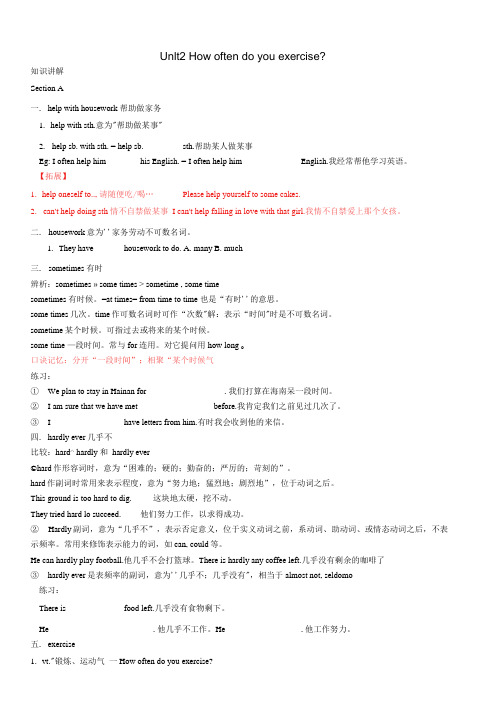
Unlt2 How often do you exercise?知识讲解Section A一. help with housework 帮助做家务1.help with sth.意为"帮助做某事"2.help sb. with sth. = help sb. ________ sth.帮助某人做某事Eg: I often help him _______ his English. = I often help him _____________ English.我经常帮他学习英语。
【拓展】1.help oneself to.., 请随便吃/喝…Please help yourself to some cakes.2.can't help doing sth 情不自禁做某事I can't help falling in love with that girl.我情不自禁爱上那个女孩。
二. housework意为''家务劳动不可数名词。
1.They have ______ housework to do. A. many B. much三. sometimes 有时辨析:sometimes » some times > sometime , some timesometimes 有时候。
=at times= from time to time 也是“有时''的意思。
some times几次。
time作可数名词时可作“次数"解:表示“时间"时是不可数名词。
sometime某个时候。
可指过去或将来的某个时候。
some time —段时间。
常与for连用。
对它提问用how long o口诀记忆:分开“一段时间”;相聚“某个时候气练习:①We plan to stay in Hainan for _________________ .我们打算在海南呆一段时间。
期中复习Unit2重点知识点汇总练习 人教版英语八年级上册
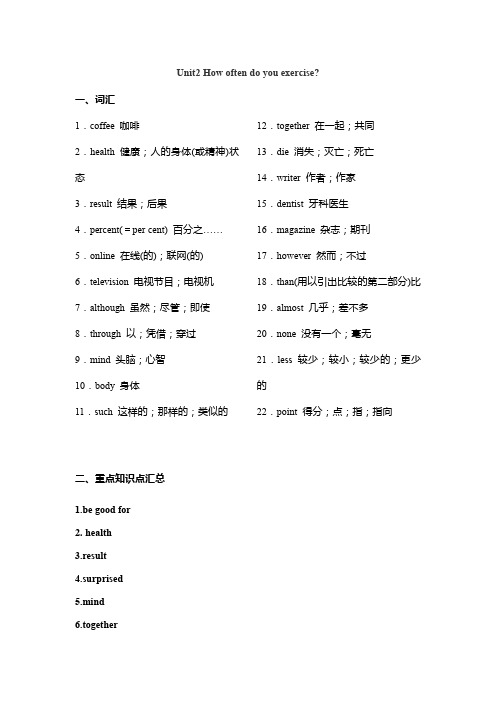
Unit2 How often do you exercise?一、词汇1.coffee 咖啡2.health 健康;人的身体(或精神)状态3.result 结果;后果4.percent(=per cent) 百分之……5.online 在线(的);联网(的) 6.television 电视节目;电视机7.although 虽然;尽管;即使8.through 以;凭借;穿过9.mind 头脑;心智10.body 身体11.such 这样的;那样的;类似的12.together 在一起;共同13.die 消失;灭亡;死亡14.writer 作者;作家15.dentist 牙科医生16.magazine 杂志;期刊17.however 然而;不过18.than(用以引出比较的第二部分)比19.almost 几乎;差不多20.none 没有一个;毫无21.less 较少;较小;较少的;更少的22.point 得分;点;指;指向二、重点知识点汇总1.be good for2.health3.result4.surprised5.mind6.together讲解版1.be good forbe good at擅长······be good to对······友好be good for对······有益处be good with善于应付······的;对······有办法2.healthin good health 健康状况良好;in poor health健康状况不好。
3.resultas a result结果,因此;as a result of由于······的原因,作为······结果;the result of······的结果。
(人教版)八年级英语上册unit2课时详案(共4课时)+语法精解+课时同步练习(含答案)

Unit 2 How often do you exercise?话题Topic 课余活动Free time activities功能Functions 能谈论从事活动的频率Talk about how often you do things语法Grammar 一、正确使用how often引导的特殊疑问句。
二、频率副词always,usually,often,sometimes,hardly ever,never 的使用。
词汇和常用表达Words & expressions 1.能正确使用下列词汇housework,Internet,program,swing,coffee,health,result,percent ,television,mind,body,writer,dentist,magazine,point,die,full,s uch,hardly,ever,once,twice,maybe,least,online,together,however,al most,less,although,than,through,none2.能正确使用下列常用表达hardly ever,swing dance,at least,junk food,such as,more than,less than3.能认读下列词汇junk学习策略Strategies 1.通过 Discussing活动,促使学生运用认知策略进行有效地学习,明确在用中、交流中学习的想法。
2.通过Classifying,Guessing活动,简化学习过程,利于记忆;通过猜测和大胆发言,以学习新知。
3.在与同学合作完成任务的活动中主动探究和学习语言;并运用知识内在规律帮助记忆、巩固知识。
文化知识Culture 了解国外中学生常见业余活动(如: swing dance)。
三维目标Three-dimensionaltarget知识与技能1.能掌握以下单词:housework,hardly,ever,once,twice,Internet,program,full,swing,maybe,least,coffee,health,result,percent,online,television,although,through,mind,body,such,together,die,writer,dentist,magazine,however,than,almost,none,less,point2.熟练掌握短语:hardly ever,swing dance,go shopping,three times aweek,at least,stay up,play sports,junk food,be goodfor,go camping,…percent of…,not …at all,such as,morethan,less than3.能掌握以下句型:—How often do you exercise?—Twice a week.What kind of dance are you learning?—How many hours do you watch TV every week?—One to four.It is good to relax by using the Internet or watching gameshows.Ninety percent of the students always use the Internet.三维目标 Three-dimensiona l target 知识 与技能 4.能了解以下语法:how often 引导的特殊疑问句及其答语;能正确使用always,usually,often,once a month,twice a week 等表示频率的词或短语。
人教版八年级上册英语unit2知识点及习题

2019-8-5Unit2Howoftendoyouexercise? 一、短语归纳helpwithhousework 帮助做家务onweekends 在周末 howoften 多久一次hardlyever 几乎从不onceaweek 每周一次twiceamonth 每月两次everyday 每天 befree 有空gotothemovies 去看电影usetheInternet 用互联网 swingdance 摇摆舞playtennis 打网球stayuplate 熬夜;睡得很晚 atleast 至少havedanceandpianolessons 上舞蹈课和钢琴课 gotobedearly 早点睡觉playsports 进行体育活动 begoodfor 对……有好处gocamping 去野营not…atallmornthan 某事Howmany+主语光bydoingsth.么?二、语法讲解1.exercise (1)(动):2)((练习:1D. plays—1)goshopping 意为“去购物”。
Go+v-ing:表示进行某项活动。
如:Goswimming/shopping/skating/skiing/fishing/climbing/hiking2)频率副词:always=allthetime,usually,often,sometimes=attimes,hardlyever,never 它们用来表示动作发生的频率,频度副词放在be 动词、情态动词和助动词之后,实义动词之前,在程度上有所区别,频率由高到低依次是:always>usually>sometimes>seldom>hadlyever>never100%80%60%30%10%0%(1).sometimes:有时候;sometime :某时;sometimes :许多次/倍;sometime:一段时间(2).hardly(adv):几乎不hard 硬的;eg:Thestoneishard.困难的;严厉的;勤奋的ahardwriter努力地;猛烈地study/rainhard 练习1、Thegroundistootodig2、Icanunderstandthem.3、It'sraining,thepeoplecangooutside.4、—How was the weather yesterday?——It rained _______. People could ___________go out.A. hardly; hardB. hard hardC. hardlyeveryday (每表示。
人教版初中英语-八年级上册-unit 2知识点+练习

初中英语题集八年级上unit2 How often do you exercise?一.词汇变形单词1.hardly adv.几乎不;简直不;刚刚——hard adj.困难的—— hardness n. 坚硬,硬性2.Internet n.因特网——international adj.国际的—— internationally adv. 国际性的;国际上的3.program n.节目;程序;课程;节目单——programmer n.程序设计者—— programmed v.训练培养4.full adj.满的;充满的;完全的—— fully adv.完全地;充分地—— fuller n. 漂洗工;套锤5.swing n.摇摆;秋千v.摇摆;旋转——swings n. 秋千—— swinging adj. 愉悦的多姿多彩的6.junk n.垃圾;废旧杂物——junky n.吸毒者adj.质量低劣的—— junket n.公费旅游7.health n.健康;人的身体或精神状态—— healthy adj.健康的,健全的—— healthily adv.健康地8.result n.结果;后果—— resulting adj.作为结果的,因而发生的—— resultant n.结果9.percent adj.百分之...的——percentage n.百分比—— percentile n. 百分位10.mind n.头脑;想法;意见;心思—— mindful adj.留心的;注意的——mindless adj. 愚笨的;不小心的11.die v.死;枯竭;消失—— dead adj.死去的完全的—— death n.死亡12.writer n.作者;作家—— writing n. 写作——write v.写13.dentist n.牙科医生—— dentistry n. 牙医学——dental adj.牙齿的牙科的14.teenager n.青少年—— teens n. 十几岁十三到十九的数字——teeny adj. 极小的15.point n.看法;要点;重点;小数点;目标;分数——pointed adj.尖锐的—— pointless adj.无意义的He (几乎不)watches TV.典型例题1.相似题1)She h (几乎不)eats anything.2)In the evening he h (几乎不)exercises.3)We could h (很难)believe our eyes.答案:hardly ever ;hardly ever; hardly ever; hardly2.Our questions were about exercise,use of the (互联网)and watching TV.相似题1)You can find all kinds of information on the (互联网).2)Most of the children like surfing the (互联网).3)(互联网)has changed our life.答案:internet;internet;internet;internet3.What is your favorite (节目)?相似题1)Mary likes the (节目)every much.2)The animal world is always kids’ favorite (节目).3)Tom and john all like the funny (节目).答案:program;program; program;program4.Next week is quiet (满的)for me.相似题1)Her life was too (满的)to find time for hobbies.2)Hotels are often (满的)at this time of the year.3)The bus was (满的)when they got there.答案:full;full;full;full5.Oh, (摇摆)dance,it’s fun.相似题1)(摇摆舞)is a kind of dancing.2)His moods alarmingly.他的心情时好时坏,令人担心.3)You’ve been on the for ten minutes,it’s my go now.你荡秋千有10分钟了,现在该轮到我了。
Unit2核心知识点讲解练习重庆市南开中学校人教版八年级英语上册

Unit 2 How often do you exercise?Section A【语言学问】1.help with housework 关心做家务〔P9〕〔1〕help with sth.意为“关心做某事〞拓展:help sb.with sth.=help sb.〔to〕do sth.关心某人做某事Eg.我常常帮他学习英语。
I often him his English.=I often him English.〔2〕housework 意为“家务劳动〞。
不行数名词。
Eg.They have housework to do(many/much).2.辨析:sometimes ,some times,sometime,some time(P9)sometimes 有时候。
=at times也是“有时〞的意思。
提问用how oftensome times 几次几倍。
time作可数名词时可作“次数〞解;sometime 某个时候。
常指将来的某个时候。
提问用whensome time 一段时间。
常与for连用。
对它提问用how long。
Eg.1.有时我起床很晚。
I get up very late.2.下周某个时候我要去上海。
I will go to shanghai next week.3.他读这个故事几遍了。
He reads the story4.我将会在这儿呆一段时间。
I'll stay here for3.hardly ever 几乎不hardly ever 相当于hardlyEg.几乎没有食物剩下。
There is _any food left.辨析:hardly 与hard:hardly 几乎不,一般位于动词之前;hard 努力地,位于动词之后。
Eg.1.他几乎不工作。
He works.2.他工作努力。
He works4.use the Internet 用互联网use sth.to do sth. 用某物做某事Eg.我用刀切面包。
人教版八年级英语上册Unit2知识点和练习

人教版八年级英语上册Unit2知识点和练习Unit 2 What’s the matter?固定短语1. Have a cold 感冒2. sore back 背痛3. neck and neck 并驾齐驱,齐头并进4. I have a stomachache 我胃痛= I have got a stomachache= There is something wrong with my stomach= My stomach hurts= I have (got) a pain in my stomach5. What’s the matter? 怎么了?= What’s the trouble (with you)?= What’s your trouble?= What’s wrong (with you)?= What’ the matter (with you)?=What has happened to you?= Is there anything wrong (with you)? = what’s up?6. sore throat 咽喉痛7. lie down and rest 躺下休息8. see a dentist 看牙医9. drink lots of water 多喝水10. hot tea with honey 加蜂蜜的热茶11.That’s a good idea 好主意12.That’s too bad 太糟糕了13.I think so 我认为如此14. I’m not feeling well. 我觉得不太舒服= I’m not feeling fine/all right.= I’m feeling ill/sick. =I feel terrible/bad.= I don’t feel well.15. get some rest 多休息16. I have no idea = I don’t know 我不知道17. stressed out 筋疲力18. I am tired 我累了He is tired. 他累了19. a healthy lifestyle健康的生活方式20. traditional Chinese doctors传统中医21. a balance of yin and yang阴阳调和22. you have too much yin.你阴气太盛23. to eat a balance diet饮食平衡24. healthy food 健康食品25. stay healthy 保持健康=keep healthy=keep in good health= keep fit26. enjoy oneself (myself, yourself, herself, himself, themselves, ourselves, itself反身代词) 玩得高兴,过得愉快=have a good time = have a wonderful time= have fun27. enjoy sth. =like sth. (名词)喜欢某物,enjoy doing sth.喜欢做某事=like dong sthpractice doing sth.练习做某事,mind doing sth. 介意做某事,finish doing sth.完成某事,give up doing sth.放弃做某事,can’t help doing sth.忍不住做某事,keep ding sth. 坚持做某事. (keep on doing sth. / keep sb. doing sth. )be busy doing sth. 忙着做某事be used to doing sth.习惯于做某事make a contribution to doing sth.为..做贡献go on doing sth. 继续做某事forget doing sth.忘记做某事remember doing sth. 记得做某事spend....(in) doing sth. 花(时间)来做某事prefer doing sth.to doing sth.比起(做...)来更愿意(做...)28. at the moment = now 此刻29. Host family 东道家庭30. Conversation practice会话练习31. I’m sorry to hear that.听到此事我很难过Section A知识要点1. What’s the matter?这句话通常用于询问别人身体有什么不舒服,或有何麻烦,后跟with构成:What’s the matter with…?类似的句子还有:What’s wrong with…? What’s the trouble with…? 他们的答语往往是表示得了什么病,或什么地方不舒服,常用句型“somebody has/have a+相应的名词”。
- 1、下载文档前请自行甄别文档内容的完整性,平台不提供额外的编辑、内容补充、找答案等附加服务。
- 2、"仅部分预览"的文档,不可在线预览部分如存在完整性等问题,可反馈申请退款(可完整预览的文档不适用该条件!)。
- 3、如文档侵犯您的权益,请联系客服反馈,我们会尽快为您处理(人工客服工作时间:9:00-18:30)。
Unit 2 How often do you exercise?1,How如何(方式)how long多长(时间)答语常用“(For/ about +)时间段”how far多远(距离)答语常用“(It’s +)数词 +miles/ meters/ kilometers”how often多久一次(频率)答语常用“Always/ often/ every day/…”或“次数+时间”等表频率的状语How soon多快,多久以后,常用在将来时中。
答语常用“in +时间段”how many多少(接可数名词)how much(接不可数名词)2,exercise作v 锻炼,运动作[c] 操,练习do morning/ eye exercises作[uc] 锻炼take much/ more exercise3,at+钟点at 7 o’clock at noon/ at night(during/ in the day)at this/ that time at the age of on+ 具体某天、星期、特指的一天、纪念日、节日on April 1st on Sunday on a cold winter morning on Teachers’ Dayin +上午、下午、晚上、年、月、季节、年代、世纪in the morning/ afternoon/ evening in 1999 in August in autumn in 1960s in the 21st century4,help sb (to)do sthhelp sb with sthwith sb’s help= with the help of sb5,do(the)housework= do chores6,频度副词(行前be 后)Always usually often sometimes seldom hardly never7,sometimes 有时(频度副词)sometime(将来)有朝一日,(曾经)某天Some times 几次,几倍some time 一段时间(前面用介词for)8,go shopping= do some shopping9,once twice three times10,at once,right now,right away,in a minute,in a moment,in no time 立刻,马上once more再一次,重新once upon a time 从前,曾经11,every day 每天everyday日常的,每天的12,on the internet13,what’s your favorite program?=what program do you like best?14,free 空闲的in one’s free time be free自由的as free as a fish freedom n.自由免费的The best things in life are free.15,be full =be busy忙的be busy doing sth/ be busy with sthbe full of充满eg:The bottle is full of milk.16,How come?怎么会?为什么?17,may be 为情态动词+动词原形,在句子中做谓语,maybe是副词,表示可能,大概,一般放在句首(perhaps)。
18,stay up doing sth熬夜做某事19,stay/ keep healthy be in good/ bad/ poor health be good/ bad for one’s health 20,at least=no less than at most=no more than21,ask sb about sth ask sb(not)to do sth ask sb for help/ advice/ information22,the result of…的结果as a result 结果23,be surprised that/ be surprised at/ be surprised to do 对…很惊讶To one’s surprise另某人惊讶的是in surprise惊讶地24,the answer to the question,a key to the door,a ticket to the ball game25,although=though(与but不能连用)Even though/ if即使,尽管as though/ if仿佛,好像26,by介词+n/ v-ing/ 代词通过…方式by oneself独自地by the way顺便问/说一下by chance/ accident偶然地by mistake错误地learn by heart记住27,the best way/ time to do 做某事最好的方式/时间28,4个花费:人+spend/ spends/ spent+时间/钱+(in)doing sth/ on sth spend time with sb 人+pay/ pays/ paid +钱+for sthIt takes/ took sb +时间+to do sth物+cost/ costs/ cost +sb +钱29,die v.死亡,消失died过去式dead adj死亡的,无生命的dead dog have/ has been dead for…=died…agodying adj垂死的,快死的death n 死亡the death of…30,before it’s too late趁来得及31,“数字+percent of+ n”作主语,谓语动词取决于nEg:Twenty percent of the students exercise every day.Twenty percent of time passes.32,no one =nobody指人,回答who,anyone,anybody的提问None指人或物,可接of 短语,(→all ≥3)回答how many/ much,any,及有特定范围(which)的提问nothing指物,回答what,anything的提问单项选择1. He _________goes to bed late. He _________goes to bed early.A. always, oftenB. often, hardly everC. never, alwaysD. hardly ever, always2. She exercises once _______twice a week, but she watches TV at least two _________six timesa week.A. or, orB. or, toC. to, toD. to, or3.---________does he go shopping? ---Twice a week.A. How B. How often C. How long D. How many times4. ---________does he use the Internet a week? ---Once.A. How B. How often C. How long D. How many times5. ---________did you sleep last night? ---Nine hours.A. How B. How long C. How many hours D. How often6. ---________did you sleep last night? ---Nine. A. How B. How long C. Howmany hours D. How often7. ---_________is it from here? ---Ten minutes by bike. A. How B. How longC. How farD. How often8. ________11-year-old girl has ________one-year-old younger brother. A. A, an B. An, aC. The, aD. The, an9. 90 percent of the students go online three times a week, ________10 percent do that twice a week.A. an otherB. anotherC. otherD. the other10. The answers ________the questions about watching TV is very interesting. A. to B. ofC. forD. at11. We knew the news ________the Internet. A. though B. across C. by D. through12. ---Did Lucy ask you ________your bike? I know hers was broken. ---No, she asked me ________my eating habits.A. about, aboutB. about, forC. for, forD. for, about13. ---Did your class go to the mountains yesterday? ---No, it was so rainy that ________of us did that.A. allB. fewC. noneD. both14. He often does ________at school. Look! He is doing morning ________over there.A. exercise, exerciseB. exercise, exercisesC. exercises, exercisesD. exercises, exercise15. _____junk food tastes very good, ______it isn’t healthy.A. Although, but B. Although, /C. But, althoughD. But,/16. My mother wants me _______milk. A. drink B. drinking C. to drink D. drinks17. Eating vegetables ________our health. A. are good for B. is good for C. are good at D. is good at18. _______is good to relax by watching games. A. It B. This C. That D. He19. Do you often stay up late ________TV? A. watching B. watch C. watchedD. to watch20. It was ________terrible that we couldn’t stand it. A. such B. so C. too D. very。
